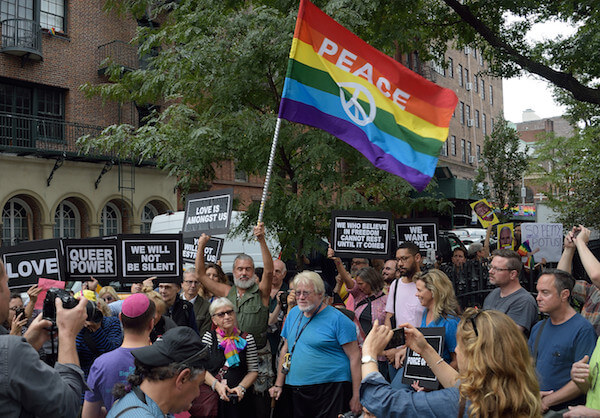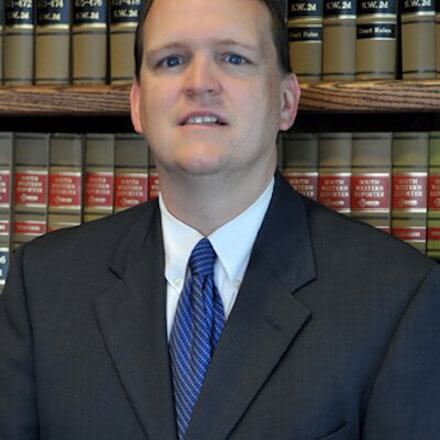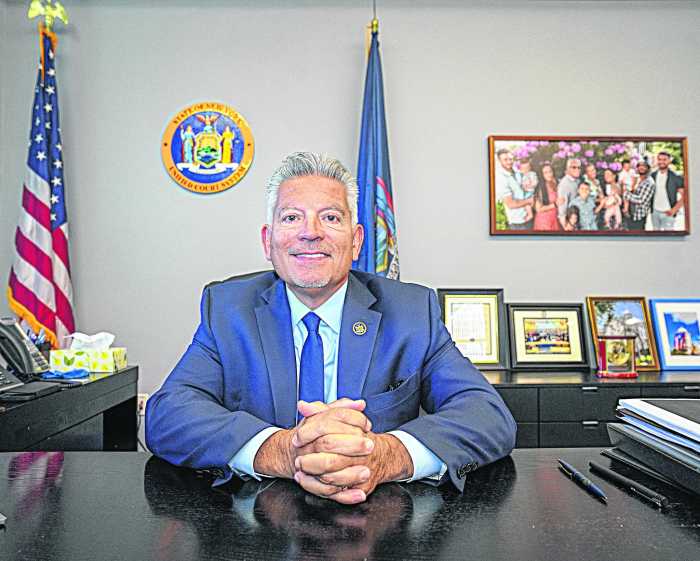Chai Feldblum, an out lesbian EEOC commissioner appointed by President Obama, has done much to advance the agency’s proactive posture on LGBT nondiscrimination policy. | US EQUAL EMPLOYMENT OPPORTUNITY COMMISSION
A November 4 ruling in a sexual orientation discrimination case brought by the Equal Employment Opportunity Commission (EEOC) shows how progress on LGBT rights may be lost in the wake of the election of Donald Trump and Mike Pence.
US District Judge Cathy Bissoon, nominated to the federal district court in Pittsburgh by President Barack Obama in 2010 and confirmed by the Senate in an 82-3 vote the following year — and a Brooklyn native who is first woman of Indian descent to sit on the federal bench — held that Title VII of the 1964 Civil Rights Act may be used to protect gay people from sexual orientation discrimination.
Dale Baxley, hired in mid-July 2013 by Scott Medical Health Center in a telemarketing position, claims he was subjected to a hostile work environment as the result of his manager Robert McClendon’s “continuing course of unwelcome and offensive harassment because of his sex.” According to the complaint filed in the case, McClendon “routinely made unwelcome and offensive comments about Baxley, including but not limited to regularly calling him ‘fag,’ ‘faggot,’ ‘fucking faggot,’ and ‘queer,’ and making statements such as ‘fucking queer can’t do your job.’” The complaint also alleges that McClendon “made highly offensive statements to Baxley about Baxley’s relationship with [his] partner such as saying, ‘I always wondered how you fags have sex,’ ‘I don’t understand how you fucking fags have sex,’ and ‘Who’s the butch and who is the bitch?’”
Obama push to broaden existing sex discrimination laws to protect LGBT Americans is at risk
Baxley was gone from the job after about a month of McClendon’s verbal abuse, a victim, he claims, of “constructive discharge” — meaning his working conditions were so miserable he was compelled to quit.
The EEOC entered this case not based on a charge Baxley filed but from the agency’s investigation of separate discrimination claims filed with its Pittsburgh office by five of Baxley’s former female co-workers. These women alleged that they were also subjected to sexual harassment by McClendon, including “unwanted touching so frequently and severely that it created a hostile and offensive work environment and resulted in adverse employment decisions being taken against them.” In the course of this inquiry, the EEOC learned about McClendon’s treatment of Baxley and Baxley’s claim that he had been constructively discharged.
The agency informed Scott Medical Health Center that its investigation “also revealed that McClendon harassed a male employee because of sex, specifically and repeatedly referring to the male employee as a ‘faggot,’ and repeatedly asking about the employee’s sexual experiences and preferences. The investigation revealed that McClendon targeted this male employee because he did not conform to what McClendon believed was acceptable or expected behavior for a male because of his association with members of the same sex rather than the opposite sex.”
That letter spelled out the conclusion that McClendon’s conduct created a hostile environment resulting in the constructive discharge of Baxley. After trying unsuccessfully to achieve a conciliation agreement with Scott Medical, the agency filed a lawsuit.
This was the first lawsuit that the EEOC filed on behalf of a gay former employee alleging his discharge was “because of sex” in violation of Title VII. In July 2015, reversing a position it held for half a century, the agency ruled that the US Transportation Department may have violated Title VII when it denied a promotion to a gay air traffic controller. After embracing the view that sexual orientation claims can be asserted under Title VII, the EEOC was on the lookout for appropriate private sector cases to bring — both in order to vindicate a public policy against such discrimination and to win a remedy for the employee involved. Its goal was to establish court precedents that would lock its interpretation into the case law. Prior to the Baxley case, all of the Title VII sexual orientation claims brought to federal courts were lawsuits filed by discrimination victims themselves, not by the federal agency.
Scott Medical sought to have the EEOC complaint dismissed, arguing that Title VII does not prohibit discrimination based on sexual orientation, citing two precedents from the Third Circuit Court of Appeals, which has jurisdiction over the federal district court in Pittsburgh. Bissoon found that in those prior decisions the Third Circuit had not been presented with all the arguments the EEOC has developed since 2015 and that more recent events have undermined their conclusions, so she found that those rulings did not compel her dismiss the complaint.
The EEOC advanced three arguments in support of its position. First, that Baxley was “targeted because he is a male, for had he been female instead of a male, he would not have been subjected to discrimination for his intimate relationships with men.” Second, that he was “targeted and harassed because of his intimate association with someone of the same sex, which necessarily takes Baxley’s sex into account.” And, third, that he was “targeted because he did not conform to his harasser’s concepts of what a man should be or do.”
This last argument is a version of the “sex stereotype” theory that the Supreme Court approved in 1989 in Price Waterhouse v. Hopkins, a case where a woman was able to sustain a sex discrimination claim because she was denied a partnership based on the conclusion by the firm’s partners that she was not sufficiently feminine in her appearance and demeanor.
Bissoon said that the EEOC’s three arguments were actually just one argument stated three different ways, “with the singular question being whether, but for Mr. Baxley’s sex, would he have been subjected to this discrimination or harassment. The answer, based on these allegations, is no.”
In denying Scott Medical’s motion for dismissal, Bissoon was ruling that if the EEOC can prove the factual allegations regarding the company’s treatment of Baxley, it will win the case.
Writing that “Title VII’s ‘because of sex’ provision forbids discrimination on the basis of sexual orientation,” Bissoon directly contradicted the two prior Third Circuit rulings cited by Scott Medical, but she found that her conclusion was consistent with the development of Title VII law dating back as early as 1983 when the Supreme Court began “broadening” its interpretation of sex discrimination in a series of cases culminating in the 1989 Price Waterhouse decision. She noted that at least one federal appeals court, the Cincinnati-based Sixth Circuit, has already used the sex stereotyping theory to extend protection to a transgender plaintiff.
As the EEOC has done, Bissoon quoted the Justice Antonin Scalia’s statement in the Supreme Court’s 1998 same-sex harassment case, Oncale v. Sundowner Offshore Services, that “statutory prohibitions often go beyond the principal evil [that Congress intended to address] to cover reasonably comparable evils, and it is ultimately the provisions of our laws rather than the principal concerns of our legislators by which we are governed.” That, from Bissoon’s perspective, means that the lack of any evidence Congress intended to prohibit sexual orientation discrimination in 1964 does not require the court to reject a sexual orientation discrimination claim in 2016.
Referring back to Price Waterhouse, the judge wrote, “There is no more obvious form of sex stereotyping than making a determination that a person should conform to heterosexuality. As the EEOC states, ‘discrimination against a person because of the sex of that person’s romantic partner necessarily involves stereotypes about “proper” roles in sexual relationships — that men are and should only be sexually attracted to women, not men.’ This discriminatory evil is more than reasonably comparable to the evil identified by the Supreme Court in Price Waterhouse. Indeed, the Court finds discrimination on the basis of sexual orientation is, at its very core, sex stereotyping plain and simple; there is no line separating the two.”
Referring to the vast changes in the legal landscape since the Third Circuit earlier ruled on this question, Bissoon wrote, “The Supreme Court’s recent opinion legalizing gay marriage demonstrates a growing recognition of the illegality of discrimination on the basis of sexual orientation. That someone can be subjected to a barrage of insults, humiliation, hostility and/ or changes to the terms and conditions of their employment, based upon nothing more than the aggressor’s view of what it means to be a man or a woman, is exactly the evil Title VII was designed to eradicate.”
Through his appointments, President Obama has moved the Third Circuit from a more conservative to a more progressive bench, but given the current mix of active judges Trump could rebalance it by filling the two vacancies that currently exist and replacing one more if an Obama or a Bill Clinton appointee takes senior status. As a result, it’s unclear how Bissoon’s ruling would be received if it ever went before the full circuit with all its active judges sitting en banc.
Meanwhile, at the EEOC, the significant progress in protecting LGBT rights came as the result of administrative rulings and litigation decisions undertaken by Obama appointees. In turn, its broad view of Title VII that it protects LGBT people from employment discrimination has been adopted by other agencies, such as the Department of Labor and the Department of Education. It seems unlikely that Trump’s appointees would keep to the same course, especially in light of last week’s announcement that Alabama Senator Jeff Sessions will be the next attorney general. In fact, it is not a sure thing that Trump will allow Obama’s executive orders banning sexual orientation and gender identity discrimination within the Executive Branch to stay in place. The requirement that federal contractors have non-discrimination policies is likely on the president-elect’s repeal list.
Fortunately, individuals can continue to file discrimination lawsuits under Title VII, so the loss of the EEOC as a plaintiff in their cases will not shut them out of court. But preserving the gains made so far may be difficult against the tide of new judicial and agency appointments that will be made beginning January 21.
Republican stalling on confirmations by the Senate has left close to 100 federal judgeships vacant, and there are hundreds of agency appointments to be made as well, all of which will cumulatively change the direction in which federal anti-discrimination law has been developing during the Obama years.
The appointment of new Supreme Court justices will matter as well, of course, because ultimately the question whether Title VII and other federal sex discrimination laws protect LGBT people will end up before that court, where a transgender “bathroom” case under Title IX of federal education law has already been accepted for review. If these cases are decided after Trump has had two Supreme Court appointments, it is reasonable to fear that a newly solidified conservative majority will not endorse such a broad interpretation of Title VII or other federal sex discrimination laws.
Elections matter.



































